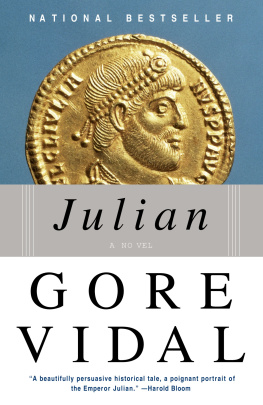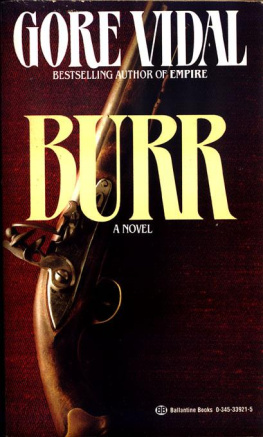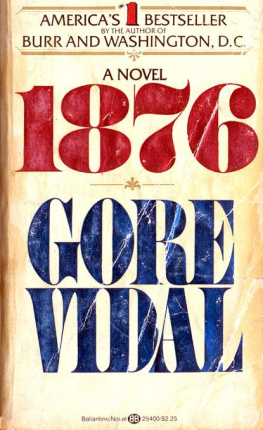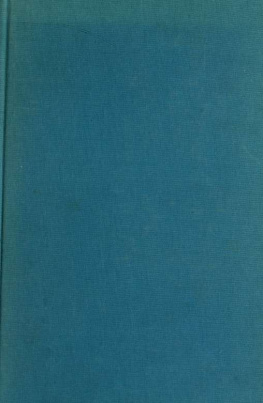Gore Vidal - Julian
Here you can read online Gore Vidal - Julian full text of the book (entire story) in english for free. Download pdf and epub, get meaning, cover and reviews about this ebook. year: 2018, publisher: Knopf Doubleday Publishing Group, genre: Detective and thriller. Description of the work, (preface) as well as reviews are available. Best literature library LitArk.com created for fans of good reading and offers a wide selection of genres:
Romance novel
Science fiction
Adventure
Detective
Science
History
Home and family
Prose
Art
Politics
Computer
Non-fiction
Religion
Business
Children
Humor
Choose a favorite category and find really read worthwhile books. Enjoy immersion in the world of imagination, feel the emotions of the characters or learn something new for yourself, make an fascinating discovery.
- Book:Julian
- Author:
- Publisher:Knopf Doubleday Publishing Group
- Genre:
- Year:2018
- Rating:5 / 5
- Favourites:Add to favourites
- Your mark:
- 100
- 1
- 2
- 3
- 4
- 5
Julian: summary, description and annotation
We offer to read an annotation, description, summary or preface (depends on what the author of the book "Julian" wrote himself). If you haven't found the necessary information about the book — write in the comments, we will try to find it.
Julian — read online for free the complete book (whole text) full work
Below is the text of the book, divided by pages. System saving the place of the last page read, allows you to conveniently read the book "Julian" online for free, without having to search again every time where you left off. Put a bookmark, and you can go to the page where you finished reading at any time.
Font size:
Interval:
Bookmark:
Acclaim for GORE VIDAL s
JULIAN
High entertainment.Gore Vidal is able to penetrate the depths of human being. Julian was enchanted with living, intensely and drivingly engaged. It is this quality of flashing vitality that Mr. Vidal admirably captures.
The New York Times Book Review
Simply great.A truly monumental novel.
Associated Press
Impressive.To the formidable task which Vidal sets himself, he brings an easy and fluent gift for narrative; a theatrical sense of scene and dramatic occasion; and a revealing eye and ear for character delineationto say nothing of wide reading.
Newsweek
Julian was the magnificent first fruit of Vidals reinvention of himself as a Roman. Ever a ventriloquist, he enters into the mind of the Emperor Julian with an eerie nonchalance.As an historical novel about the ancient world, it is every bit the equal of anything by Mary Renault or Robert Graves.
Jay Parini in
Gore Vidal: Writer Against the Grain
[Vidals] account of Julians conquest of Persiaand defeat by Persiacasts a kind of spell from which one must shake oneself awake.As a pagan hymn from a darker world, it sets some present truths into the light.
The Christian Science Monitor
No odder figure ever guided the destinies of the Roman Empire than the Emperor Julian Augustus. Here was a recluse and a scholar who became a great military leader, an ascetic who preached the life of the senses, a fatalist who believed he would remake the world.He is endlessly fascinating.
Time
GORE VIDAL
JULIAN
Gore Vidal was born in 1925 at the United States Military Academy at West Point. His first novel, Williwaw, written when he was nineteen years old and serving in the Army, appeared in the spring of 1946. Since then he has written twenty-three novels, five plays, many screenplays, short stories, well over two hundred essays, and two memoirs. He died in 2012.

BOOKS BY GORE VIDAL
NOVELS
Williwaw
In a Yellow Wood
The City and the Pillar
The Season of Comfort
A Search for the King
Dark Green, Bright Red
The Judgment of Paris
Messiah
Julian
Washington, D.C.
Myra Breckinridge
Two Sisters
Burr
Myron
1876
Kalki
Creation
Duluth
Lincoln
Empire
Hollywood
Live from Golgotha
The Smithsonian Institution
The Golden Age
NONFICTION
Inventing a Nation
SHORT STORIES
A Thirsty Evil
Clouds and Eclipses
PLAYS
An Evening with Richard Nixon
Weekend
Romulus
On the March to the Sea
The Best Man
Visit to a Small Planet
ESSAYS
Rocking the Boat
Reflections Upon a Sinking Ship
Homage to Daniel Shays
Matters of Fact and of Fiction
The Second American Revolution
At Home
Screening History
United States
The Last Empire
Perpetual War for Perpetual Peace
Imperial America
The Selected Essays of Gore Vidal
MEMOIRS
Palimpsest
Point to Point Navigation

VINTAGE INTERNATIONAL EDITION, AUGUST 2003
Copyright 1962, 1964, copyright renewed 1990, 1992 by Gore Vidal
All rights reserved under International and Pan-American Copyright Conventions. Published in the United States by Vintage Books, a division of Random House, Inc., New York, and simultaneously in Canada by Random House of Canada Limited, Toronto. Originally published in hardcover in the United States by Little, Brown & Company, Boston, in 1964. Previously published by Vintage Books, a division of Random House, Inc., in a somewhat different edition.
Vintage is a registered trademark and Vintage International and colophon are trademarks of Random House, Inc.
The first two chapters of Julian appeared in somewhat different form in Three by Gore Vidal, Signet edition of the New American Library of World Literature, Inc., 1962.
Library of Congress Cataloging-in-Publication Data:
Vidal, Gore, 1925
Julian.
Reprint of the ed. published by Little, Brown, Boston.
p. cm.
1. Julianus, Apostate, Emperor of Rome, 331363Fiction. I. Title.
[PZ3.V6668Jw10]
[PS3543.I26]
813.54
76-10593
Vintage Books Trade Paperback ISBN9780375727061
Ebook ISBN9780525565802
www.vintagebooks.com
v5.3.1
a
For Lucien Price
Contents
A NOTE
Robert Graves, when he came to publish his sequel to I, Claudius, remarked in a somewhat irritable preface that a good many reviewers seemed to think he had simply spun himself a novel from Suetoniuss gossip, which looked to them like a very easy thing to do. In Claudius the God, Graves struck back with a long bibliography, listing nearly every relevant text which has survived from the ancient world. Unfortunately, I have not read as much as all that. But to anticipate those who might think that ones only source was the history of Ammianus Marcellinus (or even of Edward Gibbon), I have included at the end of the book a partial bibliography.
The Emperor Julians life is remarkably well documented. Three volumes of his letters and essays survive, while such acquaintances as Libanius and Saint Gregory of Nazianzus wrote vivid accounts of him. Though I have written a novel, not a history, I have tried to stay with the facts, only occasionally shifting things around. For instance, it is unlikely that Priscus joined Julian in Gaul, but it is useful to the narrative to have him there.
Julian has always been something of an underground hero in Europe. His attempt to stop Christianity and revive Hellenism exerts still a romantic appeal, and he crops up in odd places, particularly during the Renaissance and again in the nineteenth century. Two such unlikely authors as Lorenzo de Medici and Henrik Ibsen wrote plays about him. But aside from the unique adventure of Julians life, what continues to fascinate is the fourth century itself. During the fifty years between the accession of Julians uncle Constantine the Great and Julians death at thirty-two, Christianity was established. For better or worse, we are today very much the result of what they were then.
In naming cities, I give the modern rather than the ancient name (Milan, not Mediolanum), except when the original name is more familiar to us (Ephesus, not Seluk). Dates I put in our fashion, A.D. and B.C. Since Julians court was a military one, I have used our own armys way of dating, i.e., 3 October 363. Currency is a tricky matter. No one is quite certain what the exact purchasing power of money was in the fourth century, but a gold solidus was probably worth about five dollars. Julian, Priscus and Libanius, the three narrators of this story, all wrote Greek. Their Latin was rather shaky, as they are quick to remind us, but they occasionally use Latin terms, much the way we do. For those readers who will search in vain for Julians famous last words, Thou hast conquered, Galilean!, he never said them. Theodoret must take credit for this fine rhetoric, composed a century after Julians death.
I should like to thank the American Academy at Rome and the American School of Classical Studies at Athens for letting me use their libraries.
G. V.

YOUTH
I
Libanius to Priscus Antioch, March [ A.D. ]
Yesterday morning as I was about to enter the lecture hall, I was stopped by a Christian student who asked me in a voice eager with malice, Have you heard about the Emperor Theodosius?
Next pageFont size:
Interval:
Bookmark:
Similar books «Julian»
Look at similar books to Julian. We have selected literature similar in name and meaning in the hope of providing readers with more options to find new, interesting, not yet read works.
Discussion, reviews of the book Julian and just readers' own opinions. Leave your comments, write what you think about the work, its meaning or the main characters. Specify what exactly you liked and what you didn't like, and why you think so.











